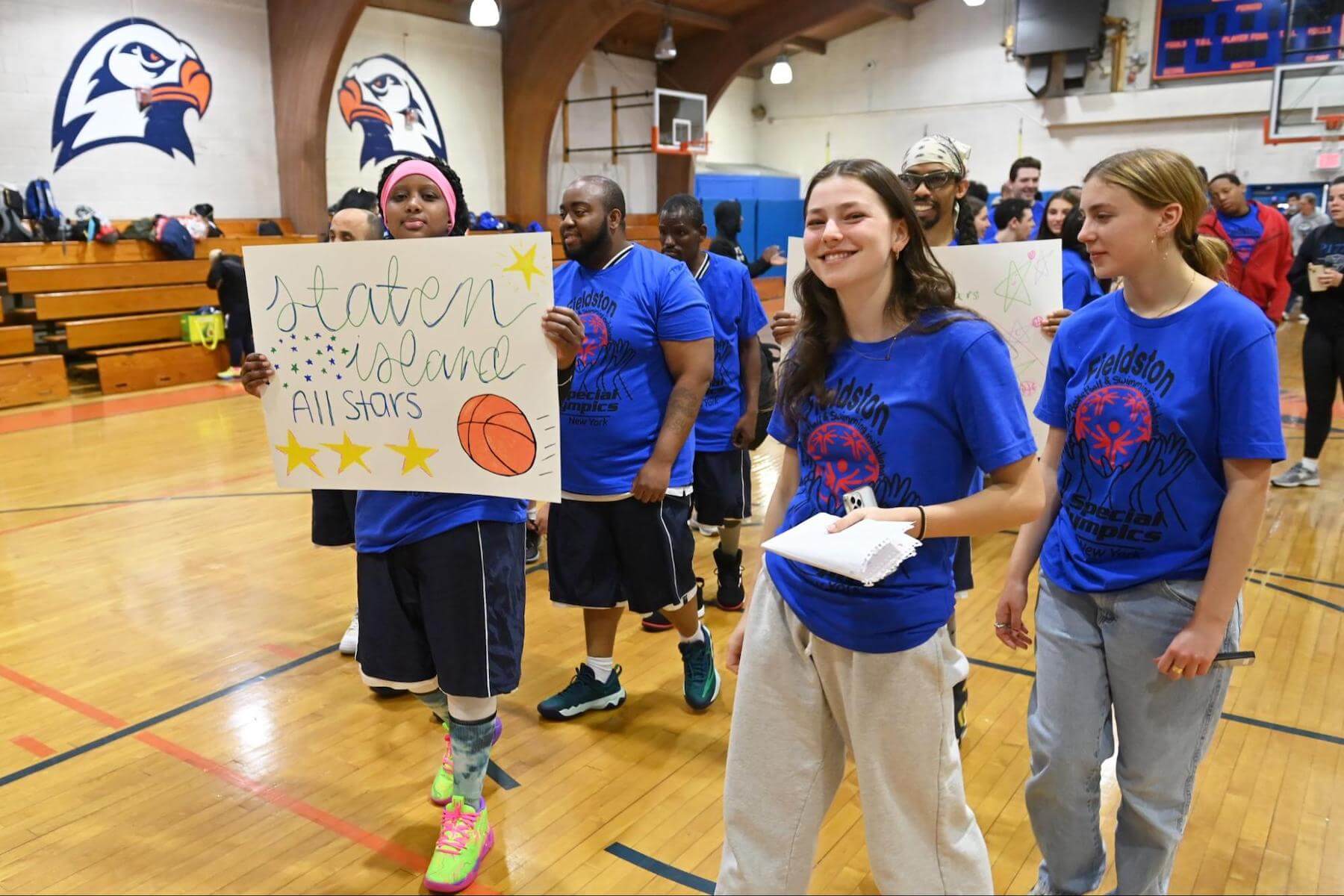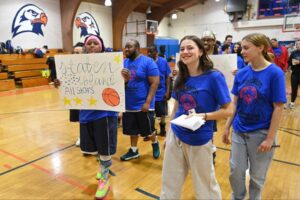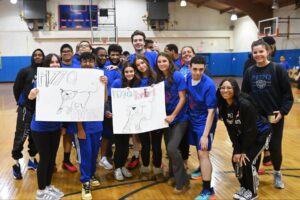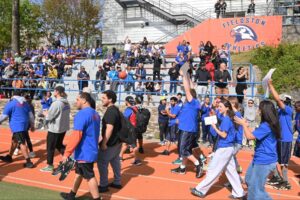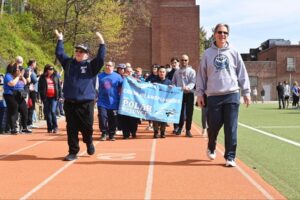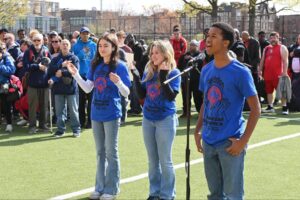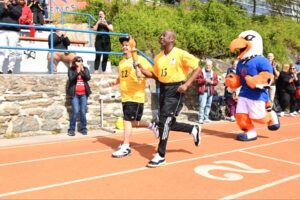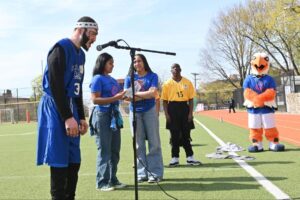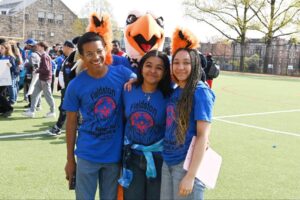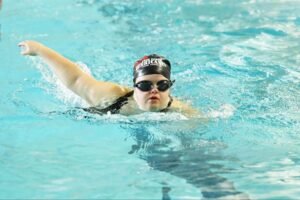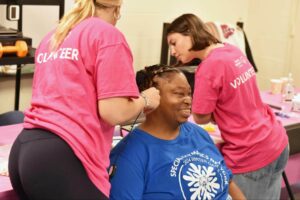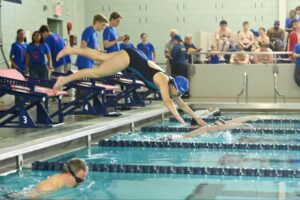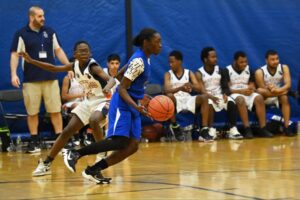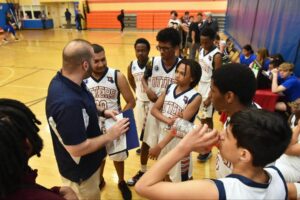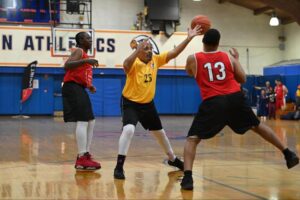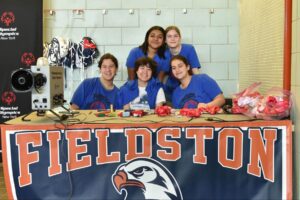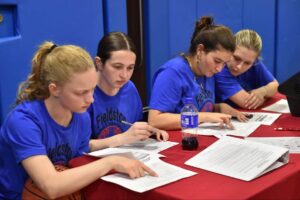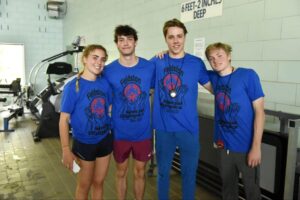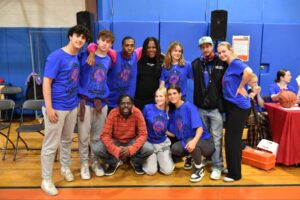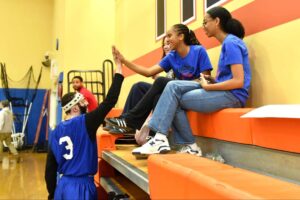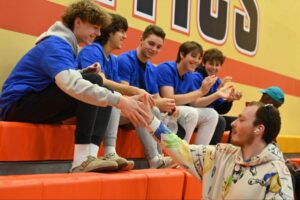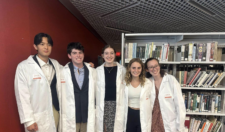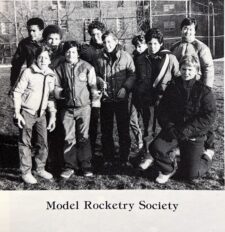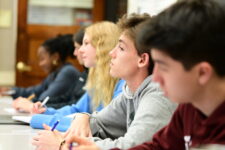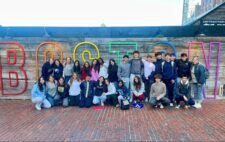Often tasked with challenging and engaging classroom assignments, Fieldston Upper students also become adaptive through their extracurricular activities. Recently, more than 100 students volunteered to plan Ethical Culture Fieldston School’s 12th annual Special Olympics basketball and swimming invitational, honing leadership skills, providing a meaningful experience for the athletes, and learning the value of dedication and effort.
Over 225 athletes were welcomed to the Fieldston campus for a sunny Saturday of sports; students and 30 parent/guardian volunteers were on hand with supportive team posters and smiles. The celebration came after months of preparation from the Special Olympics club, which offers students community service hours and has become one of the largest volunteering opportunities available to Fieldston Upper.
“The program started when a former dean in Form IV wanted to do a community-minded project,” says Special Olympics club advisor and History Teacher Karen Drohan. “The grade voted and decided to host a Special Olympics program. After the dean moved on, the program had a few different faculty advisors until the 2015–2016 academic year. Because I was new to Fieldston, I didn’t know that it was meant to only be a 10th Grade project, and I had several students from different grades asking to be involved. In the years since the 2016 event, it has become a larger program not only because of the number of athletes involved, but also the number of students who look forward to the event every year.”
“I love planning the Special Olympics event and seeing new volunteers join and understand the cause,” says club co-leader Amanda S. ’25. “When planning, we often have challenges with organization, most of all with shifting everyone around so they can volunteer. We have learned how to adapt to everyone and their busy schedules and help on the go if needed.”
“One of the great things about this program is that students start volunteering in 9th Grade, and most continue through graduation,” Drohan says. “Because of that, they see how we learn and grow with each event. They see that if something doesn’t go to plan, it is likely because we didn’t plan properly, and the next year, we change that. That isn’t just a lesson that can be seen in the classroom; it becomes a life lesson.”
After students proceeded with each team to the Upper Field at the start of the day to the cheers of spectators, Zoe V. ’25 and Ela G. ’26 kicked off the opening ceremony, thanking Drohan and Special Olympics New York for their support of the festivities. Diane Colonna, VP of Downstate Operations at Special Olympics New York, also addressed the crowd, later sharing, “Special Olympics New York is grateful for our continued partnership with ECFS. The students and administration make our athletes feel like rockstars. It is a first-class facility, and our athletes look forward to this event every year.”
Alex B. ’26 then performed the National Anthem, accompanied by Keira S. ’24 and Roxy S. ’24’s American Sign Language rendition of the song. As two athletes carried the Special Olympics Flame of Hope to the field, the Eagle mascot followed, delivering a dose of orange spirit for the day. A participating athlete also led the crowd in the recital of the Special Olympics athlete oath, reminding peers that if they cannot win, “let me be brave in the attempt.”
Basketball players and swimmers then moved to the courts and pool while student and parent/guardian volunteers kept score, emceed, distributed snacks, and encouraged teams. In addition to participating in their basketball games and swim meets, athletes could get their hearing tested on campus, as people with intellectual disabilities often receive medical attention at lower rates than the general population.
Across campus, there was a sense of pride in both the athletes’ performances and the volunteers’ commitment to creating a lively atmosphere. The students who volunteer to manage teams or help oversee fundraising and other planning ultimately learn to manage a greater level of responsibility than they may have held previously.
“This program allows students to start developing leadership skills,” Drohan adds. “For the students who volunteer for leadership roles, they have to be responsible to me, their classmates, Special Olympics New York, and especially to the athletes. We want to do everything we can to make sure this is a smooth and fun day for the athletes. And so far, with so much help from so many people, I think it has been.”
“I love to volunteer at Special Olympics as I think it’s one of the best events at Fieldston,” says parent/guardian volunteer Rachel Greenfield. “It brings together such a sense of collaboration, teamwork, and service. We as parent volunteers really take a back seat and are there to support the students who lead the entire day. The students’ enthusiasm, dedication, and interaction with the athletes contributes to the day’s impact and success.”
“I have been a part of Special Olympics since 9th Grade when I was a team manager, and since then I’ve taken on a larger role of actually planning the event,” club co-leader Hannah G. ’25 says. “I love being a part of it because of the people and the level of commitment at Fieldston. We don’t just give the organization a space to hold the event; instead, we get involved and get to see how joyful it makes the teams. Planning the event comes with many obstacles like fundraising and organizing volunteers, making sure everyone has a job that will work for them. Yet the day is so rewarding and amazing to watch all of our hard work come together.”
“My involvement with Special Olympics has taught me how to not only be adaptive and organizational but also compassionate and committed,” says Amanda. “We hope to bring the Special Olympics event to a larger group, incorporating Fieldston Middle and continuing to bring in more high school volunteers in the next few years!”
